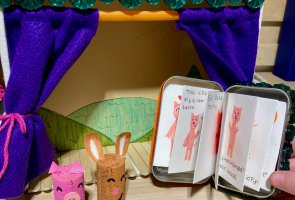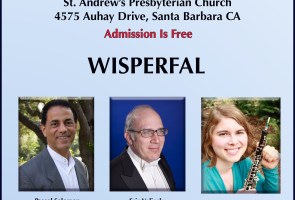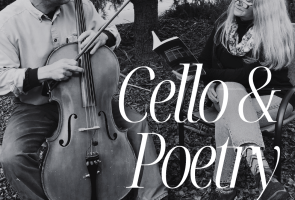ON the Beat | Blues Beach Town, for a Week

When thinking about the main subject of this column, a week when major blues-artists action (Guy Clark Jr. and Charlie Musselwhite/Elvin Bishop) makes a rare double-header appearance in the sylvan setting of Santa Barbara, my mind drifted over to Steely Dan’s ever fruitful songbook of lyrical oddities. The Dan is always good for an ironic laugh or chin-scratching ponderance. “Blues Beach,” a strange, bouncy-dark track from their underrated final album Everything Must Go sports the chorus refrain “On Blues Beach / I’m dying/Freezin’ in the merciful rays / And it’s the long sad Sunday / Of the early resigned.” (Listen up here).
How this relates to the topic at hand is admittedly ambiguous: By Sunday, will the 805 blues lover within lead to a sad resignation, to be saved only by a trip up to Cold Spring Tavern to catch the acoustic blues mastery of Tom Ball and Kenny Sultan? Close enough for blues-jazz-smartpop and non-linear cross-referencing.
Where were we? Yes, blues is on the town in a major, trans-generational way. A vital figure in the younger generation of blues — and blues-based — music, cracklingly fine guitarist-singer Guy Clark Jr. pays a return visit to the Santa Barbara Bowl tonight, August 22. The 40-year-old artist was born in the music-basted town of Austin, Texas, playing the landmark club Antone’s on his way up into a wide public spotlight, emerging with a new hybrid blues-rock-soul sound a dozen years ago. Shades of Hendrix slip into the sonic mix, with modern twists and blues in the root system. His latest album, conceived during the COVID home stay, is this year’s JPEG RAW (acronym for Jealousy, Pride, Envy, Greed, Rules, Alter Ego, Worlds), with cameos from such lofty parties as Stevie Wonder (“What About the Children,” link), George Clinton, Valerie June, and jazz trumpeter Keyon Harrold.
Over at the Lobero the next night, Friday, August 23, some deep West-Coast blues action lands in the house, with the eminent harpist-singer Charlie Musselwhite, now 80 and in sharp form, and his occasional partner in blues crimes, Elvin Bishop. The pair have crossed paths and projects off and on going back to the 80s, and they cemented the empathic connection on the 2020 album 100 Years of the Blues (Alligator Records), with touring to follow, COVID caveats withstanding.

Bishop sometimes seems misunderstood, given that his biggest radio hit, the gutsy ballad “Fooled Around and Fell in Love,” doesn’t convey his deep and long commitment to the blues. Together, they are “birds of a feather,” to quote the first tune on their 2020 album, but they’re different types of birds — Musselwhite, the Memphis-to-Chicago-to-Bay-Area zen bluesmaster and Bishop, the back porch–spirited and dirt-toned guitarist partymeister.
Under his own name, Musselwhite’s latest album comes in the form of the seductive stripped-down roughage of Mississippi Son, from 2022.
Another fortuitous collaborative project in Musselwhite’s long career came in 2012, in an impressive team-up with Ben Harper, Get Up! (link). In the promotion lead-up to that album’s release, I interviewed the pair in a BBQ restaurant in the down-home burg of Santa Monica. Musselwhite was articulate as usual on many subjects, commenting broadly that “even if there wasn’t any music called the blues, we’d still have the blues,” he laughed. “Just read the paper. Lucky for us, we have a way to express that feeling through music. If we didn’t have that, the feeling would still be there. It turns out that I-IV-V (the fundamental blues chord pattern) is a nice way to package that up.”
Harper added, “Cook it up.”
“But even that’s not necessary,” noted Musselwhite. “It could be any chord changes. The feeling is the main thing.”
“The feeling. It turns out, as history has proven, people need a place to put their emotions, constantly,” said Harper. “They figure the blues is as good as any place.”
“That is the place,” said Musselwhite.
“That’s the place,” laughed Harper. “That’s where I put mine.”
“If you do a tune with I-IV-V and use the blues scale and all that, that’s not going to make it blues, with that feeling. On the other hand, B.B. King could sing ‘Mary Had a Little Lamb,’ and you know you’re listening to the blues. It’s the feeling,” said Musselwhite.
He later expounded on the evolution of his unique harmonica approach. “I really loved the traditional style. My idea was that, if you played the blues, you played your blues. You played how you feel and express how you feel, not just memorize what your heroes have done; although that’s a good way to learn. You shouldn’t stop there,” he laughed.” “That’s just the beginning.
“To open up the harmonica, for me, I would listen to horn players, or any lead instrument. If I could hear a riff or a line in there that I thought would fit on the harmonica, I would try to adapt that, instead of just relying on whatever had already been done. That taught me the instrument. I wanted to quit thinking about the harmonica as just being a harmonica. It’s part of the blues, the human voice crying from the soul. It’s like you sing a verse and then you sing another verse with your instrument. It’s like two voices.”
TO-DOINGS:

Danish delights come together in the Danish-American outpost of Solvang on Saturday, August 24, when the ever-inviting ambience of the Elverhøj Museum plays host to noted jazz violinist Mads Tolling (see story here). Tolling, the Copenhagen-born but long NorCal-based musician has performed in Solvang in the past, and is always a welcome party, for cultural heritage and purely musical reasons.
Saturday’s performance at the Elverhøj, outside in the garden, comes with a self-defining agenda, “Mads Tolling & Colin Hagan Play the Danish-American Songbook.” Tolling and pianist-accordionist Hagan will survey Danish items from the musical cosmos, including Jacob Gade’s “Tango Jalousie,” Kim Larsen’s “Om Lidt,” folk tunes and a lyrical spin from Hans Christian Andersen. A hearty menu of Danish-ish treats and meatier stuff, not to mention Tolling’s improvisational finesse, promises to be in store.
Over at the Santa Barbara Museum of Art (SBMA), in this traditionally classically lean month of August, “A Day of Music” — Sunday from 1 to 4 p.m. — aims a spotlight at musicians from the Santa Barbara Symphony in a performance linked to the current exhibition A Legacy of Giving: The Lady Leslie and Lord Paul Ridley-Tree Collection. Violinist Jessica Guideri and principal flutist Amy Tatum are the SBS musicians headed to SBMA, with separate works making links with specific paintings on view. Music for eyes and ears.
Premier Events
Thu, Jan 09
12:30 PM
Santa Barbara
Thursday Lunchtime Meditation Class
Thu, Jan 09
5:30 PM
Santa Barbara
Blueprints of Tomorrow: A Vision Board Party
Thu, Jan 09
6:00 PM
Montecito
Raising Our Light – 1/9 Debris Flow Remembrance
Thu, Jan 09
6:00 PM
Santa Barbara
DIY Journal Workshop
Sat, Jan 11
9:00 AM
Goleta
Coffee & Community at Armitos Park/ Café y comunidad en Armitos Park
Sat, Jan 11
11:30 AM
Santa Barbara
Crafternoon: Sustainable Stagecraft
Sat, Jan 11
3:00 PM
Santa Barbara
Rattlesnake Canyon Walk
Sat, Jan 11
3:00 PM
SANTA BARBARA
Santa Barbara Music Club Free Concert Jan 11, 2025
Sat, Jan 11
6:00 PM
Ojai
An Evening of Cello and Poetry
Sat, Jan 11
7:00 PM
Los Olivos
“In Between” – Tivoli Treloar – Lucy Tucker Yates
Thu, Jan 09 12:30 PM
Santa Barbara
Thursday Lunchtime Meditation Class
Thu, Jan 09 5:30 PM
Santa Barbara
Blueprints of Tomorrow: A Vision Board Party
Thu, Jan 09 6:00 PM
Montecito
Raising Our Light – 1/9 Debris Flow Remembrance
Thu, Jan 09 6:00 PM
Santa Barbara
DIY Journal Workshop
Sat, Jan 11 9:00 AM
Goleta
Coffee & Community at Armitos Park/ Café y comunidad en Armitos Park
Sat, Jan 11 11:30 AM
Santa Barbara
Crafternoon: Sustainable Stagecraft
Sat, Jan 11 3:00 PM
Santa Barbara
Rattlesnake Canyon Walk
Sat, Jan 11 3:00 PM
SANTA BARBARA
Santa Barbara Music Club Free Concert Jan 11, 2025
Sat, Jan 11 6:00 PM
Ojai
An Evening of Cello and Poetry
Sat, Jan 11 7:00 PM
Los Olivos
























You must be logged in to post a comment.